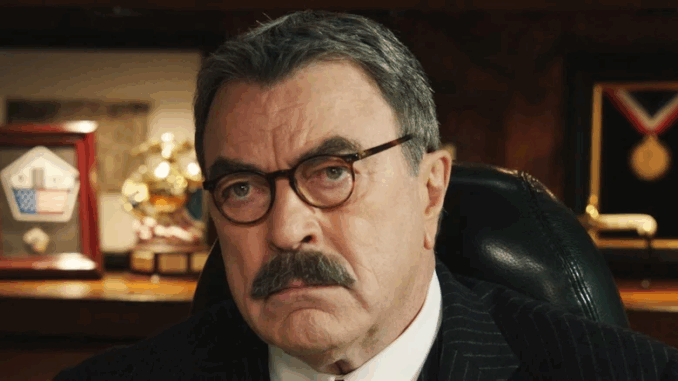
The announcement that the beloved CBS drama, Blue Bloods, would end after its fourteenth season sent shockwaves through its dedicated fan base. For over a decade, the weekly Reagan family dinner has been a television staple, with the show dominating its Friday night time slot. Yet, despite its consistent success, the network has stood firm on its decision to cancel the show.
The show’s star, Tom Selleck, who portrays the esteemed NYPD Police Commissioner Frank Reagan, has emerged as the most vocal opponent of the cancellation. In a series of candid interviews, Selleck has articulated a sentiment that resonates with millions of viewers: the cancellation is premature, unjustified by the show’s performance, and likely a mistake the network will ultimately regret. His now-famous declaration that he will “continue to think that CBS will come to their senses” has transformed a simple cancellation into a public appeal, raising crucial questions about the economic realities of long-running, successful network dramas.
The Ratings Conundrum: A Top-Tier Show Is Axed
Selleck’s argument is rooted in the simple, verifiable reality of television viewership. Blue Bloods is not a failing show limping to a merciful end; it is a ratings juggernaut.
When defending his position, Selleck often points to the raw viewing data: “We’re the third-highest scripted show in all of broadcast. We’re winning the night.” For the 2023–2024 season, the series consistently ranked as one of the most-watched scripted dramas on television, often cracking the overall Top 100 list and performing exceptionally well in the challenging 10 p.m. Friday slot.
The show’s longevity—spanning 14 seasons and nearly 300 episodes—is a testament to its consistent, loyal audience. Canceling a program that delivers such dependable numbers on a historically tough night is a move that, from a pure ratings perspective, defies logic. This stark contradiction has led Selleck to voice a profound sense of frustration, feeling that the show has been “taken for granted” by the network because its success has been so steady and reliable since its premiere.
The Problem of the Aging Hit
If ratings aren’t the issue, then what is? The answer lies in the harsh, contemporary economics of broadcast television: the cost of success.
Veteran shows, especially those with an ensemble cast, inevitably become more expensive to produce due to escalating actor and crew salaries. A series with 14 seasons under its belt and a cast full of established stars like Selleck, Donnie Wahlberg, and Bridget Moynahan, commands a far higher budget than a brand-new series.
The fact that the entire main cast reportedly agreed to a 25% pay cut just to secure the fourteenth and final season order underscores the financial pressure. Despite this massive concession, CBS made the strategic decision to retire the series, opting to “refresh the schedule” with less expensive, newer content and potential spin-offs. In an era where networks are prioritizing cost-cutting and shifting resources to streaming platforms, even a top-rated show can be viewed as too financially cumbersome.
The Sentimental Campaign: Cast and Crew United
Tom Selleck isn’t campaigning alone. The strength of his conviction is bolstered by the genuine, unwavering support of the entire cast and crew. This unity is a remarkable rarity in the industry, particularly for a show of this duration.
Selleck has stated repeatedly that the “family of actors is as close as the Reagan family” and that “all the cast wants to come back.” This is not an obligatory public statement; the emotional connection is palpable. For many, Blue Bloods has been a professional home for nearly a decade and a half.
The show’s signature Reagan Family Dinner is more than just a plot device; it mirrors the real-life cohesion on set. This shared desire to continue the story provides a powerful emotional and creative reason for renewal. The writers, too, have expressed that they are “certainly not out of ideas.” The show’s format—a blend of police procedural with intergenerational family drama—provides an inexhaustible well of storylines, preventing the creative fatigue that often plagues long-running series.
A Precedent for Reversal: The S.W.A.T. Example
Selleck’s faith in CBS “coming to their senses” may seem like wishful thinking, but the network has a very recent precedent for reversing course on a popular show: S.W.A.T.
In a shocking move, CBS initially canceled S.W.A.T. after its sixth season, only to reverse the decision days later due to a public outcry and a new deal structure, granting it a final, seventh season. Later, the network reversed itself again, renewing it for an eighth season. This tumultuous history shows that popular support and compelling economics can sway a corporate decision, giving Selleck and the Blue Bloods faithful a glimmer of hope.
The split final season for Blue Bloods—eight episodes in the Spring and the final eight in the Fall—is a tactical move that could create a final swell of attention. If the final episodes deliver a massive ratings bump, the financial argument against the show weakens further.
The Legacy and The Future
Ultimately, Tom Selleck’s fight is more than just a push for a Season 15; it’s a fight for the dignity of the aging hit show. It’s a plea for networks to recognize the value of a loyal, consistent audience—many of whom are older demographics that may not be aggressively targeted by network advertisers but still represent the bedrock of broadcast television viewership.
Whether a potential streamer like Paramount+ could step in, or whether CBS will reconsider, remains to be seen. But as Frank Reagan prepares for his last family dinner, his portrayer, Tom Selleck, is sending a defiant message: great shows don’t die quietly. The fight to save Blue Bloods is a testament to its enduring quality and the genuine affection the audience and the cast hold for the Reagan family.